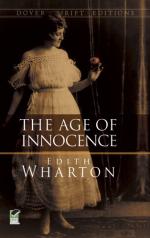“I don’t think Ellen has ever seen this room lighted up,” said May, rising flushed from her struggle, and sending about her a glance of pardonable pride. The brass tongs which she had propped against the side of the chimney fell with a crash that drowned her husband’s answer; and before he could restore them Mr. and Mrs. van der Luyden were announced.
The other guests quickly followed, for it was known that the van der Luydens liked to dine punctually. The room was nearly full, and Archer was engaged in showing to Mrs. Selfridge Merry a small highly-varnished Verbeckhoven “Study of Sheep,” which Mr. Welland had given May for Christmas, when he found Madame Olenska at his side.
She was excessively pale, and her pallor made her dark hair seem denser and heavier than ever. Perhaps that, or the fact that she had wound several rows of amber beads about her neck, reminded him suddenly of the little Ellen Mingott he had danced with at children’s parties, when Medora Manson had first brought her to New York.
The amber beads were trying to her complexion, or her dress was perhaps unbecoming: her face looked lustreless and almost ugly, and he had never loved it as he did at that minute. Their hands met, and he thought he heard her say: “Yes, we’re sailing tomorrow in the Russia—“; then there was an unmeaning noise of opening doors, and after an interval May’s voice: “Newland! Dinner’s been announced. Won’t you please take Ellen in?”
Madame Olenska put her hand on his arm, and he noticed that the hand was ungloved, and remembered how he had kept his eyes fixed on it the evening that he had sat with her in the little Twenty-third Street drawing-room. All the beauty that had forsaken her face seemed to have taken refuge in the long pale fingers and faintly dimpled knuckles on his sleeve, and he said to himself: “If it were only to see her hand again I should have to follow her—.”
It was only at an entertainment ostensibly offered to a “foreign visitor” that Mrs. van der Luyden could suffer the diminution of being placed on her host’s left. The fact of Madame Olenska’s “foreignness” could hardly have been more adroitly emphasised than by this farewell tribute; and Mrs. van der Luyden accepted her displacement with an affability which left no doubt as to her approval. There were certain things that had to be done, and if done at all, done handsomely and thoroughly; and one of these, in the old New York code, was the tribal rally around a kinswoman about to be eliminated from the tribe. There was nothing on earth that the Wellands and Mingotts would not have done to proclaim their unalterable affection for the Countess Olenska now that her passage for Europe was engaged; and Archer, at the head of his table, sat marvelling at the silent untiring activity with which her popularity had been retrieved, grievances against her silenced, her past countenanced, and her present irradiated by the family approval. Mrs. van der Luyden shone on her with the dim benevolence which was her nearest approach to cordiality, and Mr. van der Luyden, from his seat at May’s right, cast down the table glances plainly intended to justify all the carnations he had sent from Skuytercliff.




